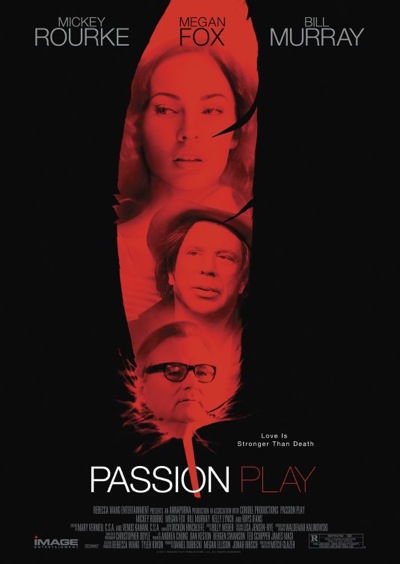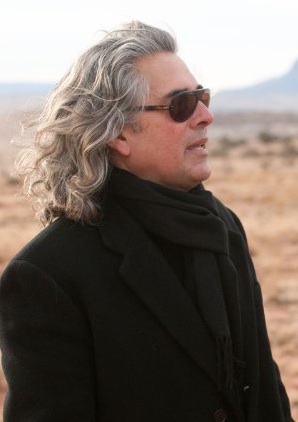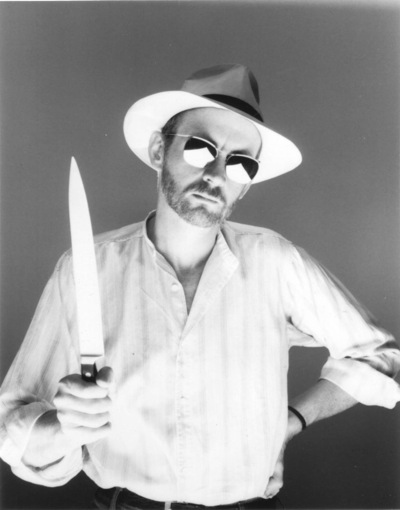
Mitch Glazer's PASSION PLAY is a labor of love two decades in the making, a go-for-broke piece of magical realism that brings together Mickey Rourke, Bill Murray and Megan Fox as, respectively, a washed-up jazz trumpeter, a murderously possessive mobster, and a beautiful carnival freak with big feathery wings sprouting out of her back. It's certainly one of the more least-expected love triangles you'll ever encounter. Add in some gorgeous neo-noir cinematography from the great Christopher Doyle, and you've got a one-of-a-kind movie to which attention must be paid.
This is Glazer's first go as a director, and it's a long way from the kind of caustic, pitch-black comedy he once wrote with the late Michael O'Donoghue. PASSION PLAY is a fearlessly sincere film about the redemptive power of love; from its forthright title to the writ-large symbolism of Fox's angelic character, the movie gives you no choice but to embrace its delirious romanticism. It's got the wild earnestness of a Sam Shepard work, only not quite as savage and far less ambiguous; Glazer knows precisely what he wants you to feel by the end of the movie, and it's to his credit that he makes the climactic big gesture in an attempt to summon those emotions. Budget limitations aside (which mostly impact the quality of the CGI), this is undoubtedly the movie Glazer set out to make.
That Glazer managed to complete the film without much of a hassle seems a minor miracle; more experienced directors have been steamrolled by the intimidating likes of Rourke and Murray. Fortunately, Glazer has a long history with both actors: he attended the same high school as Rourke, and came up through the late-'70s/early-'80s comedy ranks with Murray. There's a mutual trust here, and it's especially apparent when Rourke and Murray share the screen. Surprisingly, Murray mostly dominates Rourke in their scenes together; it's reminiscent of the dynamic from John McNaughton's MAD DOG AND GLORY - only unlike De Niro, Rourke has the bulk to bump back if he so chooses. But he allows himself to be ground down; Rourke's as vulnerable here as he was in THE WRESTLER, and his sadness brings out a real performance from Fox (who, as she showed in the unjustly maligned JENNIFER'S BODY, is capable of more than mere summer-movie adornment).
Thirty years ago, Glazer was participating in the nihilist provocation of MR. MIKE'S MONDO VIDEO; today, he's an unabashed romantic. Having chatted with him for fifteen minutes over the phone, I'm still not sure why his outlook shifted so dramatically; however, judging from his calm and friendly demeanor, I at least know how he maintained a long-term creative collaboration with the now dormant Mt. O'Donoghue. In the below interview, Glazer and I discuss the lengthy development of PASSION PLAY, the joy of directing reputed troublemakers, and, finally, the status of ARRIVE ALIVE.
In case you've never read Art Linson's memoir A POUND OF FLESH, ARRIVE ALIVE is a darkly comedic adventure script by Glazer and O'Donoghue that made it eighteen days into production back in the early '90s before being shut down. That it ever got that far - with major-studio backing (from Paramount) - is baffling. Though I've great affection for the duo's SCROOGED (and Murray's sensational performance in the film), ARRIVE ALIVE is evidently a different, rabid animal altogether. An early draft of the contained a moment that, according to Linson, was "like disemboweling Bambi as he was trying to find his mother". I've been obsessed with this project for years, and would love nothing more than to see a ballsy producer scrape together the necessary financing to get it done right. One day, perhaps...

Mr. Beaks: Early on in PASSION PLAY, it was very apparent to me that a) the film was near and dear to your heart, and b) had probably been in your head for a very long time.
Mitch Glazer: It really had. I'd always assumed that coming to directing as a screenwriter, the one strength I'd have is knowing the material better than anybody on the set. In this case, it had been decades in my head. (Laughs) So, yeah, when they'd say, "What kind of car is Nate driving?" or "What does this apartment look like?", I'd already obsessed on it for a while. You have this dream in your head, and getting it on the page is one thing; then sharing it with a larger group and trying to preserve it on screen... that's kind of a challenge. I did know it really well, so the one thing I can say about it is that it's exactly what I wanted it to be. I chased Chris Doyle for a couple of years to shoot it because I'd seen IN THE MOOD FOR LOVE, and I thought he had this elegant, rock-and-roll way of shooting that suited the material and Mickey - and I got him. You put those pieces together, and, in the end, they elevate your dream of the film.
Beaks: How did this script come to you? Was it in images or dialogue? And how many permutations were there over the years?
Glazer: If you read the first version of it, you would still see this version of it. When I first pitched it to Sony, they embraced the idea of this woman with wings, this carny freak, and I told them, "I don't want to write SPLASH with wings." I liked SPLASH a ton, but I just didn't want to write the feathered version of it. And they went, "Fine. Alright." And then when I turned it in, almost the first [note] was, "Could you make it like SPLASH with wings?"
By intent, I always wanted it to be a smaller and more personal movie, and I kind of protected it that way. Initially, the Nate character was a Hollywood Confidential sleazy kind of magazine writer, a gossip columnist who hangs out and takes pictures of movie star trysts and stuff. When Mickey came on, during our first meeting he said, "I don't know if I want to play a writer. I've always wanted to play a Chet Baker trumpet player. Would that make sense in the movie?" I thought that was brilliant. I thought that really suited him. But other than that, it kind of got honed. In the end, even in the editing room, I was pulling more dialogue out of it and going with a more visual style to carry the movie. It's probably more spare, weirdly, than the original thing I wrote.
Beaks: Mickey Rourke and Bill Murray are two people you've had long relationships with. Were you always thinking of them as Nate and Happy?
Glazer: Mickey for sure - even when he'd disappeared. I'd known him since we were fifteen. I was a year older than him, and, much to his embarrassment, got him into a high school fraternity - which he was dying to get into, I might add. Now he's way too cool for that, but back then he had to be in Keystone. I've known him forever. And then there were the lost decades where we really didn't see each other. I reconnected with him about eight years ago, before SIN CITY. He was living in the flats of Hollywood in a kind of weekly hotel - at least, that's how he described it. I gave him the script then with no hope ever of getting it made or of him having a revived career. And then it happened! So it took a while post-THE WRESTLER, but he was in it from the beginning.
I met Billy in '78. John Belushi introduced me to Bill Murray as "This is Billy, the new kid." Obviously, we worked on SCROOGED together and a bunch of other stuff. There was another actor I'd cast as Happy who, three days into shooting, called in and had this crisis of confidence; he worshipped Mickey Rourke and didn't think he'd be able to stand up to him in scenes. I tried to talk him out of it, and then I realized halfway through the conversation "If he doesn't think he can stand up to Mickey, he probably can't." So I came home Christmas - because we shot three days, then broke, and were going to go back on January 5th - and Billy called. He said (Impersonating Murray), "How's it goin'?" And I said, "Well, it's a good news/bad news deal. I love directing, but I lost my third lead." And he said, "What role?" I said, "It's the bad guy." He said, "Could I play it?" I said, "Yeah. Absolutely." So I sent him the script, and he called Christmas Day and said, "When do you need me?" Truthfully, I should've thought of him from the beginning, but maybe I just didn't want to lean on him that way. But I knew he'd do something inspired and original, and not be a stereotypical gangster. He freaked Mickey out. His way on the set was so creepy. Those were my glasses he was wearing, and... he really elevated the character. I started to write for him, truthfully. I mean, I've written for him my whole life, but once he was doing it, there were things that were written the night before, because I love his voice, and he just killed it.
Beaks: I love Murray playing a gangster. I thought he did it so well in MAD DOG AND GLORY.
Glazer: That was fantastic.
Beaks: I wish people would bring that out of him more. Is he game for roles like that, and he just doesn't get offered them?
Glazer: Completely. In life, he's one of the best-read, smartest men I've ever met. He's a forest. And he's a big, scary guy when he wants to be. Michael O'Donoghue used to call it "The Stare". When we were writing SCROOGED, if Michael was teasing him or something, Bill would just go dead-eyed. And Michael would go, "Oh, god, you're giving me 'The Stare' again." One time we were talking to Bill on the phone and he went silent, and Michael went, "The fucking stare doesn't work on the phone! I can't see you!"
It's not a menacing quality in real life, but he is an imposing guy. And, as an actor, he is up for anything. Knowing them both forever, the scenes with him and Mickey were so much fun. They come from two different schools of acting, both brilliant. And when Mickey gives up... he looks so scared in that scene, as he had to, to give Billy that power over him. And Billy kind of toys with him. It was great fun watching the two of them work.
Beaks: I really had great fun watching them. And yet, by reputation, two mercurial temperaments.
Glazer: When people in Hollywood heard I was going to make my first movie with Mickey Rourke and Billy Murray, there was that moment of, "Really?" But I've known them forever, and there was a mutual respect and affection and history that we could all draw on. Believe me, I got teased like crazy by both of them, but it wasn't anything more awful than that. It was more familial. And on set, there was no lingering in trailers or anything like that. They both knew we had twenty-eight days to make the movie, and they really were flying. It was great. They came through beautifully for me.
Beaks: Megan Fox is an actress who just gets a terrible rap. I think she's done some good work. I actually thought she was terrific in JENNIFER'S BODY. I also liked her work here. Was she your first choice for this character? And once you cast her, how did she fit in with these two heavyweights?
Glazer: She was amazing. The second I met her, there was something... she's insanely beautiful, but in an iconic, timeless way. I was looking for an Ava Gardner or Gene Tierney period beauty, and she's it. But even just meeting her... we had lunch at Little Dom's on Hillhurst, and there was a fragility to her. As I was sitting there, I was thinking, "If Lily is supposed to be this freak with wings that men pay money to stare at..." and as we were having lunch, I was looking through the window and there were paparazzi. She's completely groomed to be this character. People do pay money to see her. She has had to live at a young age with that kind of attention.
She showed up to the set completely in character. When she left, she sent me an email, and all it said was, "I miss Lily." I miss her. I don't really know Megan Fox, truthfully. Two seconds after we did the first take with her and Mickey in the desert, in the middle of the night, he grabbed me and pulled me out into the desert. He was literally jumping up and down going, "Oh, Mitchell, she can do it! She's fucking great!" You could see his relief. But she can do it. She's subtle and intuitive. I don't know if she's well trained, but she's definitely a well-prepared actor. You talk to Bill Murray or Mickey Rourke about her... two generous actors, but tough. They would work with her tomorrow. She's really got it. I don't really understand where that comes from, because I don't think she's done bad work. I mean, I've never seen TRANSFORMERS - not for an elite reason, but because I just missed them. The director of JENNIFER'S BODY [Karyn Kusama] showed me some cut footage while they were editing the movie. I just wanted to see her on screen, truthfully. And when I had lunch with her, she was so vulnerable, yet steely at the same time. That's exactly what Lily had to be. I thought she did a beautiful job.
Beaks: While we're talking about working with volatile talents, you had a long writing partnership with Michael O'Donoghue, who's one of my heroes.
Glazer: He was the best.
Beaks: There's a script you guys had called ARRIVE ALIVE. It's one of my holy grails, especially the early draft that's discussed in Art Linson's book, A POUND OF FLESH. What's the status of that script? Does it have a chance of ever getting made?

Glazer: It was for Paramount, and the entire company has been sold a couple of times since then. Weirdly enough, about three or four years ago, Walter Matthau's son Charlie had the same connection that you did, which is he read it and thought it was this touchstone of doomed, insane comedy. We had so much fun writing it. I was born and raised in Miami, and I brought Michael down there with me. He would just get stoned and sit on these airboats with these Miccosukee Indians. The actual "research" of the movie: we went to the [Miami Seaquarium] and watched Lolita the Killer Whale. And when the guy put his head in the whale's mouth, Michael said, "We've got to start with the head being chewed off." And I said, "Okay."
It was so much fun, and it came so easily I should've known there was going to be a problem. When we gave it to Bill Murray to do, to play Mickey Crews [described by Linson as a "seedy, incorrigible hotel detective"], he was semi-horrified by the body count. We ended up with Willem Dafoe. Willem is lovely and fantastic, but he is not the great comic actor of our time. Still, to this day, it's one of the few movies I've ever heard of that was shut down after eighteen days of shooting. We were actually shooting in the Seaquarium when they pulled the plug on it - and at that moment, the guy who was training Lolita said, "We have one more take in her because she's starting to get cranky." I thought, "This is really going to be ugly. The killer whale really will kill somebody."
The status of it is... I love it to death. I can't tell you what it means to me that you like it. Michael and I were really proud of it. We loved SCROOGED, but this was the purest version... this was our first collaboration as writers. We'd done a show called MR. MIKE'S MONDO VIDEO together, but as a feature this was the first we'd ever done. I still go back and look at the script. If you know any brave moguls, send them my way. I would love to see it out in the world.
So would I. Hey smart, literate producers who can handle the rough stuff: there's an unproduced Michael O'Donoghue/Mitch Glazer screenplay just sitting out there. What are you waiting for? Get on it.
PASSION PLAY is currently available via VOD, and might be playing in a theater near you.
Faithfully submitted,
